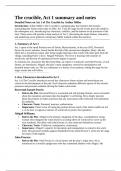The crucible, Act 1 summary and notes
Detailed Notes on Act 1 of The Crucible by Arthur Miller
Introduction: Arthur Miller’s The Crucible is a gripping play that explores the hysteria
surrounding the Salem witch trials of 1692. Act 1 sets the stage for the events that will unfold in
the subsequent acts, introducing key characters, conflicts, and the intense social pressures of the
time. These notes will provide a deep analysis of Act 1, discussing the major themes, characters,
and underlying socio-political commentary Miller embeds within the narrative.
1. Summary of Act 1
Act 1 opens in the small Puritan town of Salem, Massachusetts, in the year 1692. Reverend
Parris, the town's minister, kneels beside the bed of his unconscious daughter, Betty. She has
fallen into a mysterious stupor after being caught dancing in the woods with other girls from the
village, including Parris’s niece, Abigail Williams. The town is buzzing with rumours of
witchcraft, and the fear of supernatural forces begins to spread.
As tensions rise, characters like Reverend Hale, an expert in witchcraft, and John Proctor, a local
farmer, are introduced. Abigail, the play’s main antagonist, reveals her manipulative and
deceitful nature early on. The act culminates in a frenzy of accusations, setting the stage for the
tragic events that will follow.
2. Key Characters Introduced in Act 1
Act 1 of The Crucible introduces several key characters whose actions and motivations are
critical to the development of the plot. Each character embodies different aspects of the societal
pressures and personal vendettas driving the Salem witch trials.
Reverend Samuel Parris:
Role in the Plot: Reverend Parris is a paranoid and self-pitying minister, more concerned
about his reputation and status than his daughter’s well-being. He is deeply insecure
about his position in Salem and fears that any association with witchcraft will undermine
his authority.
Character Traits: Paranoid, insecure, authoritarian.
Importance: Parris’s fear of losing his position drives much of the initial conflict in Act
1, as he tries to suppress rumours of witchcraft to protect his reputation.
Abigail Williams:
Role in the Plot: Abigail is the primary antagonist of the play, a manipulative young
woman who instigates the witch trials by accusing others of witchcraft to cover up her
own misdeeds. Her affair with John Proctor is a key motivator behind her actions.
Character Traits: Vindictive, manipulative, charismatic.
Importance: Abigail’s capacity for deception and manipulation is central to the witch
trials. Her personal vendetta against Elizabeth Proctor (John Proctor’s wife) sets the stage
for much of the tragedy.
John Proctor:
Role in the Plot: John Proctor is a local farmer and the play’s tragic hero. He is
introduced as a morally upright man who has committed adultery with Abigail. His





